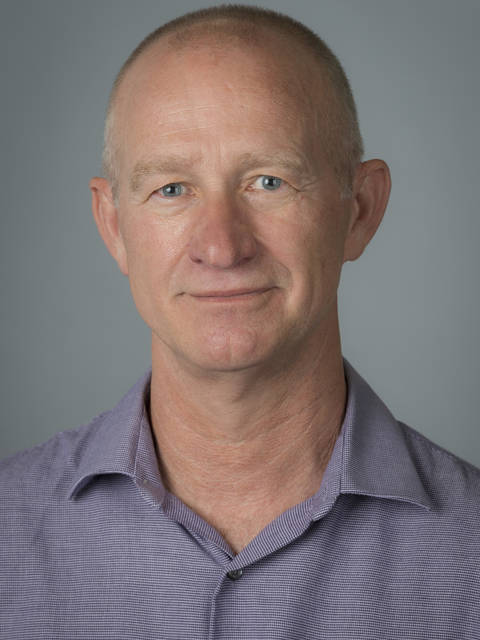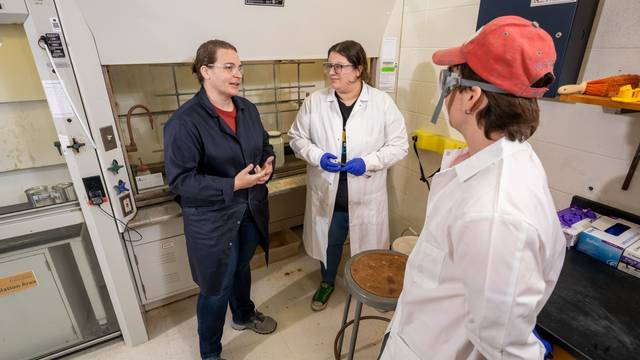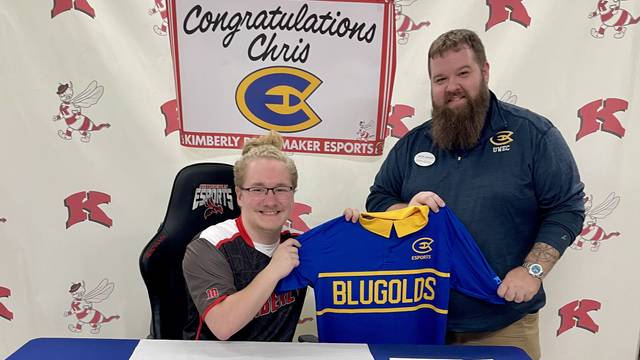Henry Lippold and the University of Wisconsin-Eau Claire’s broadcast journalism program were synonymous for more than three decades.
Lippold, who developed UW-Eau Claire’s broadcast journalism curriculum when he came to campus in 1972, mentored hundreds of students, many of whom are respected radio and television journalists in Wisconsin and throughout the country. He retired from UW-Eau Claire in 2001.
A Wisconsin Broadcasters Hall of Fame member who died in 2018, the legendary professor will remain linked to his beloved broadcast journalism program at UW-Eau Claire with the renaming of the radio and broadcast studio, and control rooms in Hibbard Hall as the Henry Lippold Broadcast Suite.
A celebration of the studio naming will be at 4 p.m. Friday, Nov. 19, in Hibbard Hall.
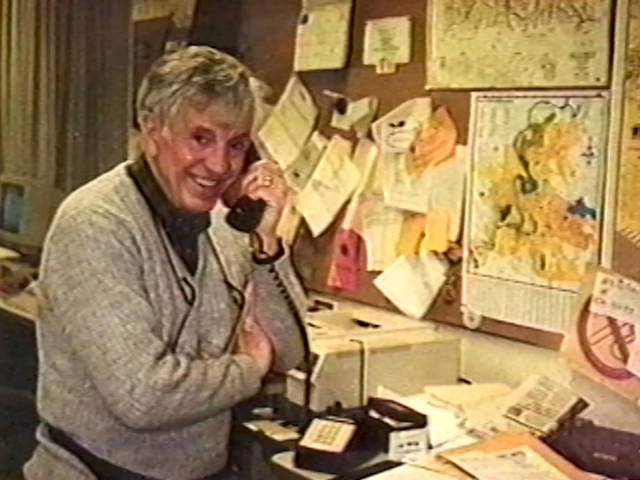
Henry Lippold was well known at UW-Eau Claire for working all hours of the day and night to make sure his broadcast journalism students learned proper news gathering techniques and journalistic ethics.
“I can’t think of anyone more fitting to honor than Henry Lippold,” says Jan Larson, professor and chair of UW-Eau Claire’s communication and journalism department. “I’m so excited to have the opportunity to name the lab after such a revered professor.”
Alumni donors and friends contributed $50,000 to a UW-Eau Claire Foundation memorial fund in Lippold’s name, enabling the university to make technology improvements that will support Blugold journalism students as they prepare for their careers. Improvements include updating computers and cameras, and financing a new control board for the radio station.
The broadcast studio is used in the communication and journalism department curriculum, Larson says, calling updates to the studio “mission critical” in a technology-intensive medium like broadcast journalism.
“The studio is used every semester, sometimes all day long,” Larson says. “To have alumni give back in this way helps so many students. We always love new scholarships, but this particular fund benefits students exponentially.”
Larson fondly recalls her interactions with Lippold over the years.
“When I came to UW-Eau Claire as a young faculty member, Henry was the gold standard,” Larson says. “As alumni say, Henry was the man who never slept because news never slept. He was effervescent and energetic at all hours of the day and night.”
Lippold had a 55-year academic and broadcasting career. While attending college at UW-Madison, he worked at radio stations in Oshkosh, Poynette and Madison. He worked at a Portland, Oregon, newspaper before enrolling in a master’s degree program at Northwestern University and working at a Chicago radio station.
Lippold was a television anchor at a Cedar Rapids, Iowa, station before teaching at the University of Illinois in Urbana, Illinois, while also working as news director, anchor, reporter and writer at a TV station.
After moving to Eau Claire in 1972 to start the university’s broadcast journalism program, he also continued his journalism career by working part time at WEAU-TV. Even after his retirement in 2001, Lippold continued to produce news programs for Wisconsin Public Radio and Chippewa Valley Community Television.
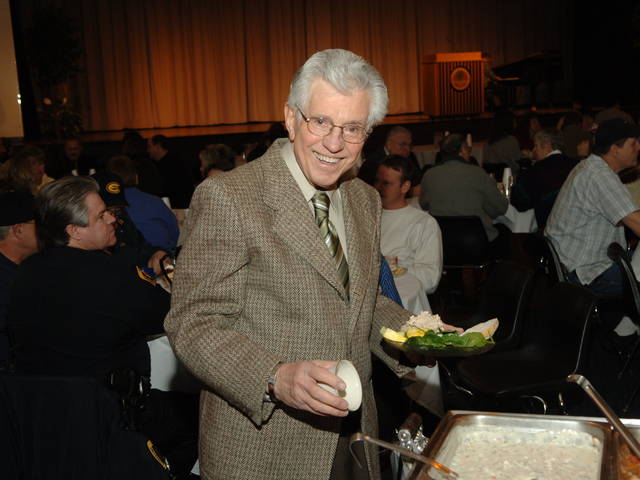
Henry Lippold had a 55-year academic and broadcasting career, working at TV and radio stations, and the University of Illinois in Urbana, Illinois, before being hired at UW-Eau Claire in 1972.
Lippold is recalled for his boundless energy, his signature “tip top” response to most inquiries about his wellbeing, and his enthusiasm for news and his students. The professional journalists mentored by Lippold during his 30-year career at UW-Eau Claire never forgot their professor, who remained in touch with many of them decades after they graduated.
Lippold had a “gigantic impact” on the career of 1979 journalism graduate Pat Peterman, who worked as a radio reporter and anchor, TV news producer and a community access programming director. Lippold taught students about the responsibilities of being a journalist, and thanks to the teachings of the influential UW-Eau Claire instructor, Peterman still “waves the Henry flag for journalistic morals and ethics.”
“He made news fun and he made news adventurous and he made news exciting,” Peterman says. “He really stirred my sense of curiosity, which I think is a character trait that I have carried with me through my life.”
Tom Joles, a 1980 journalism graduate, remembers being “totally lost” at UW-Eau Claire as he repeatedly switched majors looking for a future career. His then-girlfriend Peterman — now his wife — suggested he consider broadcast journalism as she raved about Lippold’s teachings.
“I met Henry Lippold and he took me through the process and allowed me to be something I never expected I could be, which was a valuable person in society,” Joles says. “He coached me up, he looked out for me, he loved me, he got me my first job as an intern in Green Bay. Without that I don’t know what I would have done; he looked out for me so hard and so vigilantly.”
Joles retired four years ago after 29 years as an anchor reporter at an Albuquerque, New Mexico, TV station. Lippold’s absolute belief in the capabilities of his students and the journalistic standard he set during classes and in the Update News broadcasting studio stuck with Joles throughout his career.
“It mattered,” Joles says of the work students did in the UW-Eau Claire broadcasting studio. “Even if it was college TV, this was the most important thing at the time. We had to get it right. He set the standard for that. I worked with him for a couple of years and then I worked on my own for 40-some years, but I always carried Henry Lippold with me.
“He was always whispering in my ear regardless of where I worked — whether it was Green Bay or Tel Aviv or Albuquerque. His voice was always there and it was always leading me in a really good direction.”
Lippold gave direction to 1980 journalism graduate Rick Foy from Foy’s first days on UW-Eau Claire’s campus.
“It’s that passion and energy that I remember the most,” Foy says. “A remarkable sense of humor. The passion and commitment to students and wanting to see you succeed, not just as a student, but along the way, preparing you to be an effective professional.
“Henry cared for all of us and believed in all of us. He wanted us to succeed, but there were high expectations too. He instilled in his students his appreciation for the profession at a very early stage in our academic careers at UW-Eau Claire.”
Foy worked in sports broadcasting before switching to higher education, where he was the UW-Eau Claire Foundation’s associate director of major gifts. Today, Foy is UW-River Falls’ assistant chancellor of university advancement.
“You look in the newsrooms around the country, over the decades, you see Henry Lippold products everywhere, in markets the size of New York City and markets the size of Eau Claire, Wisconsin, all achieving,” Foy says. “And for those of us who chose related professions to transition to, we were prepared for that too.”
Jim Mertens, a 1984 journalism graduate, recalls how disappointed he was when he discovered the low wages he would receive in his first professional journalism job. Lippold reminded Mertens what was important.
“Henry said you have to start at the bottom, you have to work your way up, be good at your craft, it’ll pay off,” says Mertens, who now is co-anchor at WQAD-TV in the Quad Cities. “(Lippold said) you’re not in it for the money, you’re in it to inform people. To be honest, of all the lessons I learned, that perhaps was the biggest.”
Anyone wishing to contribute to improvements to the broadcast studio and its technology can donate to the Henry Lippold Memorial Fund.
